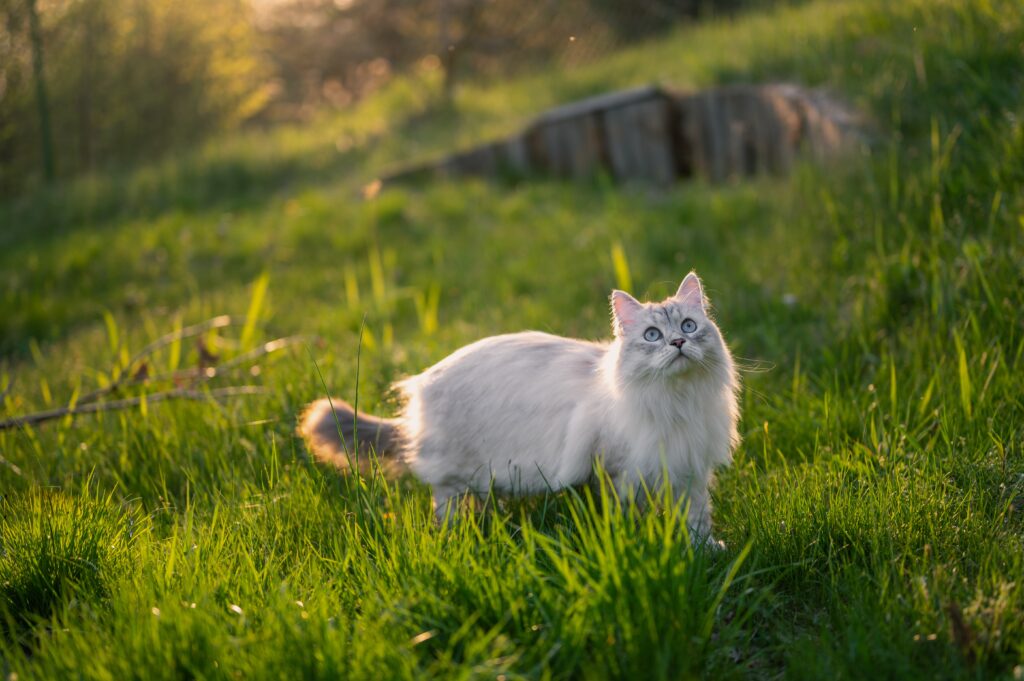Do Kitties Enjoy Spending Time Outdoors?
Cats have a reputation for being independent and adventurous creatures, which leads to the question: do kitties enjoy spending time outdoors?
While the answer isn’t one-size-fits-all, it’s essential to explore the dynamics of outdoor life for cats, the benefits it offers, and the precautions
that responsible cat owners should take when allowing their feline friends to roam the great outdoors.

The Urge for Exploration
Instinctual Behavior
Cats are natural hunters, and their ancestors were solitary predators who roamed vast territories in search of prey.
This instinctual behavior is still deeply ingrained in domestic cats today. They are hardwired to explore, stalk, and pounce.
Sensory Stimulation
The outdoors provide a wealth of sensory stimulation for cats.
The rustling leaves, chirping birds, and scents of the natural world engage their senses and fulfill their innate curiosity.
Outdoor exploration offers mental and sensory enrichment.
The Benefits of Outdoor Time
Exercise and Activity
Outdoor time allows cats to get the exercise they need to maintain a healthy weight and strong muscles.
The open space encourages running, jumping, and climbing, providing physical stimulation.
Mental Stimulation
Exploring new environments and encountering various stimuli keeps a cat’s mind sharp and engaged.
This mental stimulation can help prevent boredom and related behavioral issues.
Vitamin D
Sunlight exposure allows cats to produce vitamin D, which is essential for their overall health.
It helps regulate calcium and phosphorus levels, promoting strong bones and teeth.
Safety Concerns
Traffic Hazards
One of the most significant safety concerns for outdoor cats is traffic. Roads pose a severe risk to cats, as they may dart across streets
unpredictably. Traffic accidents are a leading cause of injury and fatalities among outdoor cats.
Predators and Wildlife
Cats can encounter predators such as dogs or other larger animals when outdoors.
Additionally, they may harm local wildlife, leading to ecological concerns and potential legal issues in some areas.
Disease and Parasites
Outdoor cats are at higher risk of contracting diseases and parasites, including feline leukemia, feline immunodeficiency virus (FIV), ticks, fleas,
and intestinal parasites. Regular vet visits and preventive measures are crucial for their health.
Balancing Outdoor Time and Safety
Supervised Outdoor Time
For those who want their cats to experience the outdoors safely, supervised outdoor time on a leash or within a secure enclosure
(catio) can provide the best of both worlds. Cats can explore while being protected from potential dangers.
Enriching Indoor Environment
Creating a stimulating indoor environment with toys, scratching posts, and climbing structures can help indoor cats satisfy their need
for exploration and play while remaining safe indoors.
Conclusion
In conclusion, whether kitties enjoy spending time outdoors depends on their individual personalities and experiences.
While outdoor exploration can be enriching and fulfilling for cats, it comes with significant safety concerns that responsible cat owners must address.
Supervised outdoor time, in a controlled and secure environment, can offer the benefits of the outdoors while minimizing risks.
Alternatively, creating a stimulating indoor environment can keep cats mentally and physically active without exposing them to outdoor dangers.
Ultimately, the well-being and safety of your furry companion should be the top priority.
By providing the right balance of outdoor and indoor experiences, you can ensure that your kitty enjoys a happy and healthy life.
FAQs
- Are some cat breeds more suited for outdoor life than others?
- Certain breeds, such as the Maine Coon or Bengal, may be more adaptable to outdoor life due to their size and temperament.
However, individual personality and upbringing play significant roles in a cat’s suitability for outdoor living.
- Certain breeds, such as the Maine Coon or Bengal, may be more adaptable to outdoor life due to their size and temperament.
- Can I train my indoor cat to enjoy supervised outdoor time?
- Yes, with patience and positive reinforcement, many indoor cats can learn to enjoy supervised outdoor experiences.
Start with short sessions and gradually increase the time spent outdoors.
- Yes, with patience and positive reinforcement, many indoor cats can learn to enjoy supervised outdoor experiences.
- How can I protect my outdoor cat from diseases and parasites?
- Regular veterinary check-ups, vaccinations, and preventive treatments for fleas, ticks, and worms are essential for outdoor cats.
Consult your veterinarian for a personalized preventive plan.
- Regular veterinary check-ups, vaccinations, and preventive treatments for fleas, ticks, and worms are essential for outdoor cats.
- What is the lifespan of an outdoor cat compared to an indoor cat?
- Outdoor cats typically have a shorter lifespan than indoor cats due to the higher risks they face, including accidents and exposure
to diseases. On average, indoor cats tend to live longer, healthier lives.
- Outdoor cats typically have a shorter lifespan than indoor cats due to the higher risks they face, including accidents and exposure
- Are there alternatives to outdoor time for indoor cats?
- Yes, you can provide indoor cats with mental and physical stimulation through interactive toys, puzzle feeders, window perches,
and cat trees. These enriching activities can help satisfy their need for exploration and play indoors.
- Yes, you can provide indoor cats with mental and physical stimulation through interactive toys, puzzle feeders, window perches,
